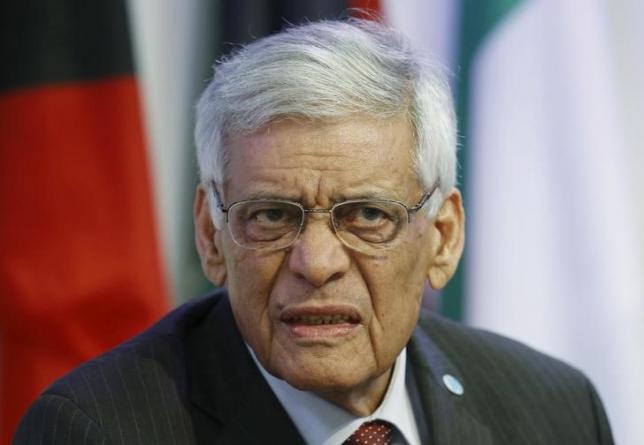LONDON | Reuters.- OPEC secretary general Abdullah al-Badri listens to a news conference after a meeting of OPEC oil ministers in Vienna, Austria, December 4, 2015. REUTERS/Heinz-Peter Bader

OPEC secretary general Abdullah al-Badri listens to a news conference after a meeting of OPEC oil ministers in Vienna, Austria, December 04, 2015. (REUTERS/HEINZ-PETER BADER)
OPEC officials said on Monday the oil market was poised to start rebalancing itself after prices sank to their lowest since 2003, a sign the exporter group will stick to its policy of not cutting supplies without help from rival producers.
Oil prices have collapsed to below $28 a barrel this month from $100 in mid-2014 on a supply glut. The drop gained impetus after the Organization of the Petroleum Exporting Countries in late 2014 shifted strategy to defend market share, not prices.
The price drop has started to slow the development of relatively expensive supply sources such as U.S. shale oil and forced companies to delay or cancel billions of dollars worth of projects, putting some future supplies at risk.
«We expect that we will go through one more downturn cycle of oil price. But we will recover. The market is definitely going to balance itself because today’s oil price is not sustainable whatsoever,» Qatar’s Energy Minister Mohammed al-Sada told a conference in London.
Speaking at the same conference, OPEC Secretary-General Abdullah al-Badri said he also saw reason for optimism, citing forecasts for further growth in global oil demand in 2016 and a contraction in non-OPEC supply.
«We already see some signs that supply and demand fundamentals will start to correct themselves in 2016,» Badri said at the conference at Chatham House.
Earlier, Badri said OPEC and non-OPEC producers needed to work together to tackle an excess of oil inventories so prices can recover and investments in new fields begin.
So far, major non-OPEC producers such as Russia have refused to work with OPEC by cutting supplies, although Oman and Azerbaijan have expressed willingness to do so.
«It is vital the market addresses the issue of the stock overhang,» Badri said. «This is now central to the return of a balanced market.»
The price slide has squeezed income in producing nations and is particularly painful for OPEC members such as Venezuela, who depend heavily on oil income and lack the capacity to pump more.
Venezuela has requested OPEC hold an emergency meeting to discuss steps to prop up oil prices. But OPEC’s Gulf members including Saudi Arabia, who led the 2014 policy shift, have opposed earlier calls for emergency meetings.
The Qatari minister, whose country holds OPEC’s rotating presidency this year, said the request was being considered although he declined to say if he was in favor.
«We received a request and oil ministers are discussing that,» he said. «It is being evaluated.»
While non-OPEC supply is expected to fall this year, output from OPEC could rise following the lifting of sanctions on Iran, Iraq’s plan to further expand supplies and no sign of Saudi Arabia cutting back from near-record levels.
Iraq may further raise oil output in 2016, reaching levels as high as 4 million barrels per day (bpd) from the country’s south, a senior Iraqi oil official, who asked not to be named, said on Monday.
Iraq has been producing from its southern fields around 3.7-3.8 million bpd in recent months.
